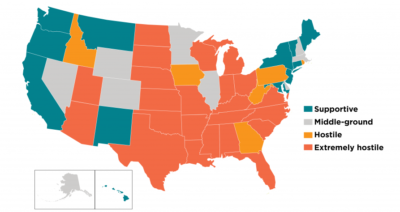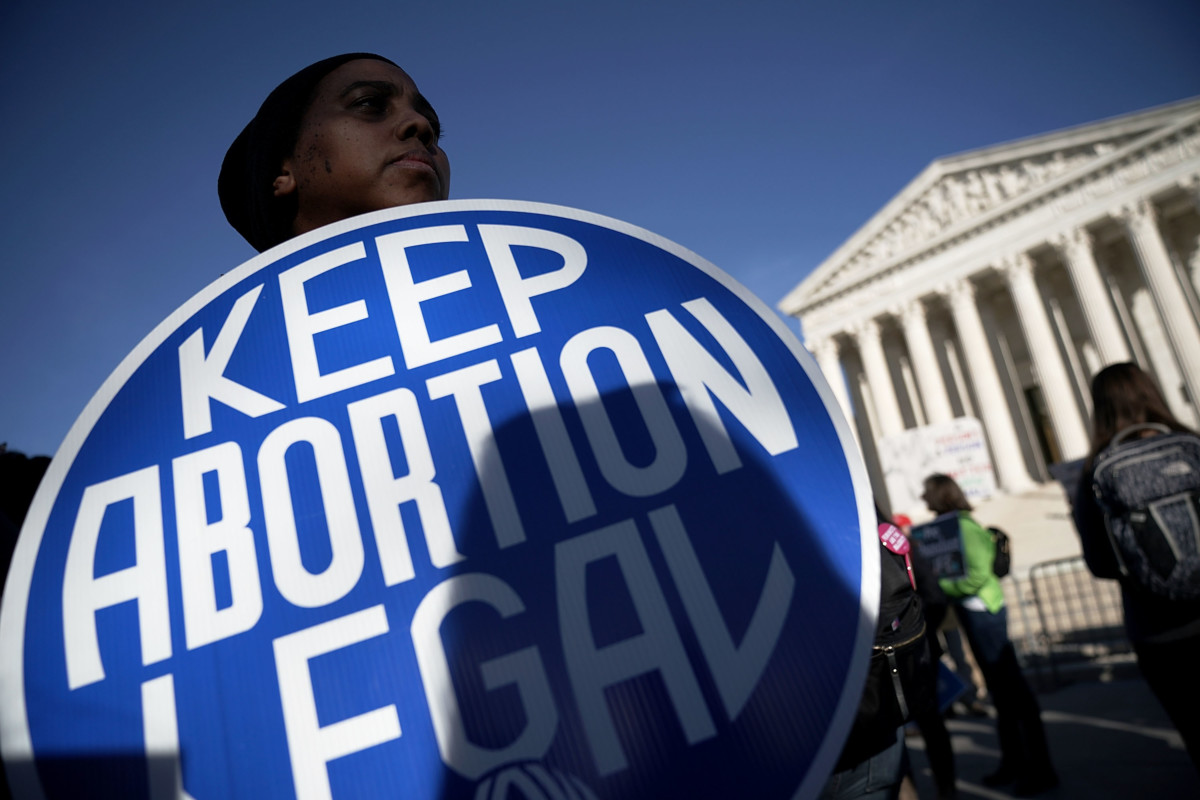In a widely watched referendum held on May 25, the citizens of Ireland voted by a 2-to-1 margin to repeal an amendment to their constitution that effectively outlawed abortion. That country’s abortion laws are currently among the most restrictive in Europe, with Irish women forced to travel abroad to obtain an abortion or to resort to clandestine and potentially dangerous procedures. Research has shown that laws restricting abortions don’t lower rates but make them less safe.
But while Ireland is joining most of Europe in making abortion legal, at least in the early stages of pregnancy, the United States — and the Southern states in particular — are moving in the other direction. And this November, voters in two Southern states, Alabama and West Virginia, will weigh in on ballot measures that would add anti-abortion provisions to their state constitutions.
The measures, both placed on the ballot by the legislatures, come amid a state-level attack on abortion rights that intensified with the 2010 elections when anti-abortion conservatives took power in capitals across the South and the rest of the nation. Over one-third of all abortion restrictions enacted since the 1973 US Supreme Court’s Roe v. Wade decision legalizing abortion were enacted between 2010 and 2017, according to the Guttmacher Institute, a reproductive rights research and policy organization.

And states aren’t limiting access to abortion only: They are also restricting the availability of family planning services by blocking funds to providers that offer abortions. The campaign to do so has intensified since an anti-abortion group released deceptively edited videos in 2015 seeking to discredit Planned Parenthood. Last year alone, for example, four states including South Carolina and Texas limited certain family planning providers’ eligibility for Medicaid, the joint federal-state health insurance program for low-income people and those with disabilities.
Opponents of the upcoming anti-abortion ballot measures say Republicans are putting largely symbolic questions on the ballot in a critical election year to try to drive conservative turnout. But conservatives say that if Roe is overturned — which President Trump aims to achieve through his judicial appointments — they want to ensure state constitutions have no provisions protecting abortion rights.
“A Total Ban” in Alabama
The Alabama measure is one of four questions that will be on the state’s ballot in November. Another one would allow the display of the Bible’s Ten Commandments in public spaces — the campaign for which is being led by the former chief strategist for former state Supreme Court Justice Roy Moore, a Republican who lost his 2017 run for the US Senate amid allegations of sexual misconduct involving teenage girls.
Alabama’s anti-abortion ballot measure would make it state policy to “recognize and support the sanctity of unborn life and the rights of unborn children, including the right to life,” and to state that no provisions of the constitution provide a right to an abortion or require funding of abortions.
The measure was sponsored by Republican state Rep. Matt Fridy, an attorney from Shelby County, and was overwhelmingly approved for the ballot by the legislature. Fridy has said he wants to ensure that “the Alabama Constitution cannot be used as a mechanism by which to claim that there is a right to abortion.”
First elected in 2014, Fridy is up for re-election this year and faces fellow Republican Stephen Bryant in the June 5 primary. The winner will face Democrat Jack Jacobs, an attorney who has no primary opposition, in the November general election. As of late May, no committees to support or oppose the Alabama ballot measure had registered in the state, according to Ballotpedia.
Planned Parenthood representatives have referred to the Alabama proposal as a “trigger law” aimed at quickly blocking abortion access in the state should Roe be overturned. “The net impact is that it would completely outlaw abortion access in the state of Alabama regardless of the situation,” Katie Glenn, the Alabama director of Planned Parenthood Southeast, told the Tuscaloosa News. “It is [a] total ban.”
Alabama already prohibits abortions after 20 weeks except in cases where the woman’s life or health would be endangered by continuing the pregnancy. It also limits public funding of abortion to cases involving rape or incest or those where the woman’s life is endangered by the pregnancy. And it imposes a 48-hour waiting period for a woman seeking an abortion and requires minors to obtain parental consent.
West Virginia’s “Right to Restrict”
The anti-abortion measure that will go before West Virginia voters is one of two ballot questions they’ll consider this November, with the other related to the legislature’s authority to budget for the state judiciary.
Amendment 1 would add language to the West Virginia constitution stating that “nothing in this Constitution secures or protects a right to abortion or requires the funding of abortion.” The proposal had 15 sponsors in the legislature — all of them Republicans and 12 of them men. It passed the state Senate by a vote of 25-9 and the House by a vote of 73-26.
Leading the campaign in support of the measure is West Virginians for Life, which had raised over $7,500 and spent over $4,100 as of late May. Though Ballotpedia reports that no committee has yet registered to oppose the measure, the reproductive rights advocacy group WV FREE and the American Civil Liberties Union of West Virginia have said they plan public-education campaigns against it.
Here’s how the Charleston Gazette-Mail described the impetus behind the measure:
In 1993, the West Virginia Supreme Court overturned a state law that prohibited Medicaid coverage for abortions, except to save the life of the mother or in cases of rape, incest or fetal anomalies. Justices found that the law discriminated against poor women. Medicaid now pays for abortions found to be “medically-necessary,” meaning for a woman’s well-being.
Supporters of the resolution have said they want to undo that Supreme Court decision; they also said they want to make clear that state lawmakers have the right to restrict abortion.
West Virginia now prohibits abortions after 20 weeks except in cases where the pregnancy is a threat to the woman’s health, according to the Guttmacher Institute. The state also mandates counseling on the potential negative psychological effects of abortion (despite science that calls such alleged effects into question), imposes a 24-hour waiting period for a woman seeking an abortion, and requires that the parents of a minor seeking an abortion be notified.
Last year for the first time, West Virginia joined the group of states that the Guttmacher Institute rates as “hostile” to abortion rights. Only one other Southern state — Georgia — is in that group. The 11 other Southern states — Alabama, Arkansas, Florida, Kentucky, Louisiana, Mississippi, North Carolina, South Carolina, Tennessee, Texas, and Virginia — are rated as “extremely hostile.”
Press freedom is under attack
As Trump cracks down on political speech, independent media is increasingly necessary.
Truthout produces reporting you won’t see in the mainstream: journalism from the frontlines of global conflict, interviews with grassroots movement leaders, high-quality legal analysis and more.
Our work is possible thanks to reader support. Help Truthout catalyze change and social justice — make a tax-deductible monthly or one-time donation today.
